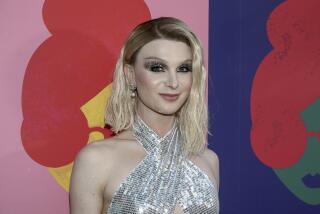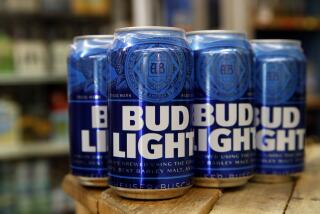Budweiser turns to music in bid to attract younger beer consumers
- Share via
ST. LOUIS — On Saturday night in Philadelphia, one of the biggest names in hip-hop took the stage. Somewhere above him was a familiar logo.
Budweiser’s Made in America Music Festival, headlined and “curated” by Jay-Z, was a two-day concert, a celebration of the diversity of the American experience, and — above all — the latest step in a bid by Anheuser-Busch to make the King of Beers cool again.
Budweiser has a problem. Sales have been slumping for 25 years. At the peak of its popularity, in 1988, more than 1 in every 4 beers sold in the U.S. bore Budweiser’s red-and-white label. Last year, it was 1 in 12. For the first time ever, it’s being outsold by Coors Light.
There are many reasons for this quarter-century of unrelenting decline, such as the rise of Bud Light and the growing popularity of spirits. But most worrisome for the future of Budweiser is the simple fact that young people just don’t drink it much.
And with a generation accustomed to a cornucopia of craft beer, weaned on sweeter-flavored malt beverages and content to swig retro brews like Pabst Blue Ribbon, it can be hard for a brand that’s sort of always been there to break in.
“One of our biggest challenges is really just to get people to notice us,” said Rob McCarthy, vice president of Budweiser for Anheuser-Busch. “Because we’re not new.”
That may seem odd for such a well-known brand, one that research firm Millward Brown recently ranked as the 48th most valuable brand in the world.
But it makes sense to Eric Shepard, executive editor of trade publication Beer Marketer’s Insights. “My guess is a lot of young people have just never drank it,” he said.
Budweiser has long had two main planks in its marketing efforts. One focused on its heritage and tradition — think Clydesdales — the other on sports, particularly Major League Baseball, with which Anheuser-Busch just renewed its sponsorship deal through 2018.
Now, in a bid to get more exposure to younger consumers who may not watch much baseball or be so impressed with the beechwood aging process, Budweiser is building a third plank: music.
“We have an opportunity to do a better job with non-sports fans,” McCarthy said.
The brand has long had a hand in big concerts — the annual Budweiser SuperFest ran for two decades in the 1980s and ‘90s, and it sponsored several big Rolling Stones tours.
That connection has faded in recent years, but since taking the job in early 2011, Anheuser-Busch’s new vice president for marketing, Paul Chibe, has made a conscious effort to find new ways to use music to sell beer. The biggest effort yet was this year’s Made in America Music Festival.
Although the series started in 2011, this year’s version was considerably amped-up. Anheuser-Busch partnered with hip-hop mogul Jay-Z, who helped recruit many of the acts, which included up-and-comers such as Santigold, rock giants Pearl Jam and a reunion of ‘80s rap group Run DMC.
Director Ron Howard signed on to film a documentary. And TV ads, narrated by Jay-Z, ran in heavy rotation during and since the Olympics. It was all to send a message, McCarthy said.
“We started with the music, but it’s more than that,” McCarthy said. “It’s a property — Budweiser Made in America — that celebrates the diversity of young adult culture and experience.”
At the concerts and smaller ones like it around the country this summer, Budweiser also tried out another experiment. Project 12 is a series of special-edition variations on Budweiser, made by brew masters at Anheuser-Busch’s 12 U.S. breweries. They served samples and took feedback, and plan to release three of the brews in stores in a mixed 12-pack in late October.
That’s the kind of thing that might get Chris Melkus to buy some Buds. The 28-year-old from Maryland Heights, Mo., doesn’t typically drink Budweiser. There are so many other, more flavorful, choices these days, he said.
But, Melkus said, he’d probably try the Project 12 beers, which include amber brews and a wheat beer. Budweiser ought to experiment a little more if they want to stand out on the beer aisle, he said.
“Bud’s just very generic,” he said. “I think most people who drink Budweiser don’t really care about beer.”
When Anheuser-Busch let that perception develop is when Budweiser started to go astray, said Tom Pirko, managing director of consulting firm Bevmark.
Instead of focusing on what made Budweiser unique, the brewer “commoditized” the brand to sell Bud Light, Pirko said. Now Bud Light is the nation’s bestselling beer, but Budweiser is stuck with image problems.
“They had an opportunity to jump on the rising sensibilities of craft beer,” Pirko said. “Budweiser could have been the one beer that was loaded with taste. It could have been the brand that outshined the rest. But it’s not.”
Logan writes for the St. Louis Post-Dispatch/McClatchy.
More to Read
Inside the business of entertainment
The Wide Shot brings you news, analysis and insights on everything from streaming wars to production — and what it all means for the future.
You may occasionally receive promotional content from the Los Angeles Times.











